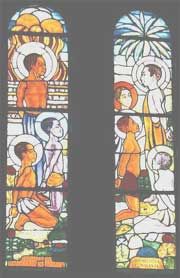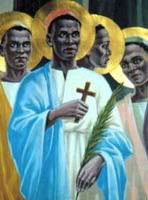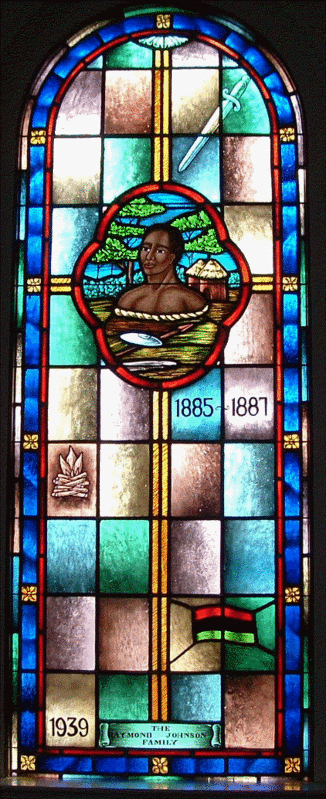Today, June 3, we celebrate the feast day of Saints Joseph Mkasa, Charles Lwanga and 20 martyrs of Uganda (died 1886). These relatively modern-day saints and martyrs—mostly children—died for their faith with joy, as observed by witnesses of their martyrdom. Their courage and conviction reminds us that unquestioning trust in the Lord and the faith of a child are attributes to aspire to, even in the midst of our “adult” priorities, worries, and preoccupations.
The birth of the Church in Africa was built on the lives of courageous martyrs for the faith, whose death was the “spark” of the flames of Christian love. Missionaries spread the word of God, and often paid with their lives. The task of evangelizing quickly fell to the newly converted, who undertook the preaching of the Gospel with love and zeal. It is to another African from centuries before the deaths of the Ugandan martyrs, Tertullian (160–225), to whom we owe the aphorism “the blood of the martyrs is the seed of the Church.” For many Ugandan Christians, the seed of their Church is the blood of these 22 young men.
Today, the Catholic Church thrives in Uganda, but this was not always the case. In 1879, a French Catholic missionary group—the Society of Missionaries in Africa (also known locally as “the White Fathers”)—reached Uganda, and received permission from then-king Mutesa to live and evangelize in Uganda. Along with this group, King Mutesa authorized a Protestant and Muslim group of missionaries as well, all of whom worked, preached, and taught their faiths. The members and staff of the royal court became highly sought-after converts, and upon Mutesa’s successor seizing the throne, many of the royal court had already embraced Christianity. The struggle for power created a violent and dangerous atmosphere for the nation’s fledging Christians.
The newly ascended king—King Mwanga (the son of Mutesa, who had ruthlessly deposed his father)—was both violent and paranoid himself. He ruled his court through fear and coercion, and his pages—mostly youth—were under constant threat of his temper and sadistic tendencies. The Christians at Mwanga’s court struggled to protect the youth from their ruler, who began looking for opportunities to force them to renounce their faith (due to fears that the Church was gaining too much power, threatening his unstable monarchy).
Upon the martyrdom of the leader of the Christian community—Saint Joseph Mkasa—the instruction and safekeeping of the youth of the royal court fell to Charles Lwanga. Joseph had courageously stood up to the king, condemning his execution of a Protestant missionary. The king, who had previously considered Joseph a friend (after he had saved his life from a poisonous viper with his bare hands), ordered him bound and burnt alive. He was fueled by the advice of his trusted advisors, who repeatedly stated that Joseph’s allegiance lay with “another king”—the King God of the Christians. Prior to death, Joseph forgave the king, pleading the case of the children. He stated to the executioner, “A Christian who gives his life for God is not afraid to die. Tell Mwanga, that he has condemned me unjustly, but I forgive him with all my heart.” The executioner was so impressed with Mukasa that he beheaded him swiftly before tying him to the stake and burning his body. His powerful witness inspired what happened next.
Charles Lwanga picked up where Joseph had left off, organizing prayer meetings for the youth of the court, and generally keeping them out of the king’s hands. This, however, aroused the paranoia and suspicion of Mwanga, who after ruthless questioning of one of the pages, determined that religious instruction was poisoning the minds of the youth and preventing them from acquiescing to his orders. The youth, no more than 13, informed the king of his teacher’s name-- Denis Ssebuggwawo—who the king promptly had executed by sticking a spear through his throat.
Religious instruction and prayer was forbidden at the court following that incident, but the Christians—on fire for their faith—were unable to be deterred. When little changed, King Mwanga ordered the royal court sealed-- no one could come or go, except the royal executioners whom he had summoned. He gathered all the attendants in the throne room, dividing them into two groups: Christian and non-Christian. He stated, “Those who do not pray stand by me, those who do pray stand over there." In all 20 young men and boys chose the “Christian” group. When Mwanga asked them if they intended to remain Christian, they gave a joyful affirmation, and were promptly sentenced to death. With death imminent, Charles Lwanga baptized those youth ready for baptism, in preparation for their ascent to heaven.
The 20 boys and young men were ordered on a 37 mile march to the place of execution—a journey which would take them past the home of the White Fathers who greeted them on the road, offering absolution. The missionaries would later remark that the boys were laughing and talking on their way to death, filled with joy at their imminent journey to heaven, and filled with the courage of the Lord. Of primary notice was a 13 year old youth, Kizito (one who had been baptized shortly before by Lwanga), who also drew the attention of the guards. He, and two companions, were killed upon the road. His companions, Andrew Kagwa, a local chief—had converted many to Christianity, and Matthias Murumba, an assistant judge, raising the ire of the counselor in charge of the execution party. When the counselor described what he was going to do with Matthias, he mocked the men, saying, "No doubt his god will rescue him." Matthias answered peacefully, "Yes, God will rescue me. But you will not see how he does it, because he will take my soul and leave you only my body." Matthias was cut up on the road and left to die with Andrew and Kizito -- it took him at least three days to slowly bleed to death from his injuries.
Upon arrival at the place of execution—Namugongo—the now 17 prisoners were locked up for 8 days while a large funeral pyre was constructed. During that time, the martyrs prayed and sang together, relishing in the love of God. On June 3rd, before turning their attention to the main group of prisoners, the executioners put Charles Lwanga to death on a small pyre on the hill above the execution place. He was wrapped in a reed mat, with a slave yoke on his neck, and was forced to arrange his funeral pyre himself. To increase his suffering, the fire was first lit under his feet and legs. These were burnt to charred bones before the flames were allowed to reach the rest of his body. Taunted by the executioner, Charles replied: "You are burning me, but it is as if you are pouring water over my body." He then remained quietly praying. Just before the end, he cried out in a loud voice "Katonda! (My God!).”
Following his death, the remaining youth were tightly wrapped in reed mats, had their feet removed, and were burnt alive in a large funeral pyre. Among those who perished was Mbaga, the son of the chief executioner, who had converted to Christianity and resisted his father’s pleas to renounce his faith. The youth died calling on the name of Jesus and proclaiming, "You can burn our bodies, but you cannot harm our souls."
Also among the martyrs was a soldier, converted to Christianity, James Buzabaliawo. When sentenced to death by the king, the brave soldier joyfully stated, "Goodbye, then. I am going to Heaven, and I will pray to God for you." On his way to death, he passed by one of the White Fathers, Father Lourdel, who recorded many of the events leading up to the execution. Upon sensing the sadness of the White Father, James smiled, pointed to heaven, and stated, "Why are you so sad? This is nothing to the joys you have taught us to look forward to."
The twenty-two Roman Catholics martyrs celebrated on June 3 include:
Achilles Kiwanuka
Adolphus Ludigo-Mukasa
Ambrose Kibuuka
Anatoli Kiriggwajjo
Andrew Kaggwa
Antanansio Bazzekuketta
Bruno Sserunkuuma
Charles Lwanga
Denis Ssebuggwawo
Gonzaga Gonza
Gyavira
James Buuzabalyawo
John Maria Muzeeyi
Joseph Mukasa Balikuddembe
Kizito
Luka Baanabakintu
Matia Mulumba
Mbaga Tuzinde
Mugagga
Mukasa Kiriwawanvu
Noa Mawaggali
Ponsiano Ngondwe
Along with these brave men were eleven Anglican and Protestant martyrs. The martyrs at Namugongo were not Mwanga’s only victims. Dozens more Christians were killed in the surrounding countryside, and some of those who had taught the faith were singled out for special retribution. Many of their names are lost to history, but their sacrifice for the faith is remembered.
Following these deaths, missionaries working in Uganda were expelled, and forbidden to re-enter the country until King Mwanga’s death. However, fueled by the courageous deaths of the martyrs, underground Christianity spread throughout the country, and upon the return of missionaries, an active faith community emerged.
Pope Paul VI spoke of the faith legacy of the Ugandan martyrs in his homily celebrating their canonization:
"The African martyrs add another page to the martyrology – the Church’s roll of honor – an occasion both of mourning and of joy. This is a page worthy in every way to be added to the annals of that Africa of earlier which we, living in this era and being men of little faith, never expected to be repeated.
In earlier times there occurred those famous deeds, so moving to the spirit, of the martyrs of Scilli, of Carthage, and of that “white robed army” of Utica commemorated by Saint Augustine and Prudentius; of the martyrs of Egypt so highly praised by Saint John Chrysostom, and of the martyrs of the Vandal persecution. Who would have thought that in our days we should have witnessed events as heroic and glorious?
Who could have predicted to the famous African confessors and martyrs such as Cyprian, Felicity, Perpetua and – the greatest of all – Augustine, that we would one day add names so dear to us as Charles Lwanga and Matthias Mulumba Kalemba and their 20 companions? Nor must we forget those members of the Anglican Church who also died for the name of Christ.
These African martyrs herald the dawn of a new age. If only the mind of man might be directed not toward persecutions and religious conflicts but toward a rebirth of Christianity and civilization!
Africa has been washed by the blood of these latest martyrs, the first of this new age (and, God willing, let them be the last, although such a holocaust is precious indeed). Africa is reborn free and independent.
The infamous crime by which these young men were put to death was so unspeakable and so expressive of the times. It shows us clearly that a new people needs a moral foundation, needs new spiritual customs firmly planted, to be handed down to posterity. Symbolically, this crime also reveals that a simple and rough way of life – enriched by many fine human qualities yet enslaved by its own weakness and corruption – must give way to a more civilized life wherein the higher expressions of the mind and better social conditions prevail.”
O God, by whose providence the blood of the martyrs is the seed of the Church: Grant that we who remember before you the blessed martyrs of Uganda, may, like them, be steadfast in our faith in Jesus Christ, to whom they gave obedience, even unto death, and by their sacrifice brought forth a plentiful harvest; through Jesus Christ our Lord, who lives and reigns with you and the Holy Spirit, one God, for ever and ever.
Year 2: Day 154 of 365
Prayer Intentions: Courageous lives of faith
Requested Intentions: Successful employment for couple (K); For employment for children (K); For health of friend, for successful relationships for children, for safe pregnancy for daughter (C); For the health of a mother (J); Virtue for daughter (V); Successful acceptance to college for nephew (M); For the health of a cousin (T); Freedom from legal difficulties for husband (S); Husband’s freedom from illness (L); Personal intentions (S); Successful passing of dental board examination (P); Blessings on a family (Z); Successful permanent employment (C); Healing of a son with autism (J); Son’s successful employment (L); For the intentions of family and relatives, for the Carthusian community (T); For personal intentions (A); Restoration of lost hearing (C); Resolution of relational and financial challenges (S); Comfort following loss of husband, security for family, assistance with housing (B); Healing and return of brother (O); Successful hermitage foundation (S); Support from family, permission to marry (H); Recovery of wife following surgery, freedom from depression (W); Protection and recovery of mentally ill daughter (J); Successful resolution to legal proceedings (N); Freedom from worry and successful employment (M); For successful sale of home and freedom from debt (J); Freedom from pain and illness (E).
Why pray the Rosary every day for a year?
Each time the Blessed Virgin has appeared-- whether it be to Saint Bernadette Soubirous at Lourdes; to Lucia, Jacinta, and Francisco at Fatima; or to Mariette Beco at Banneux-- she has asserted the importance, saving grace, and power of praying the Holy Rosary on a daily basis. Based upon her words, the Rosary is penance and conversion for sinners, a pathway to peace, an end to war, and a powerful act of faith in Jesus Christ. Pope Paul VI presented the Rosary as a powerful means to reach Christ "not merely with Mary but indeed, insofar as this is possible to us, in the same way as Mary, who is certainly the one who thought about Him more than anyone else has ever done."
To show us how this is done, perhaps no one has been more eloquent than the great Cardinal Newman, who wrote: "The great power of the Rosary consists in the fact that it translates the Creed into Prayer. Of course, the Creed is already in a certain sense a prayer and a great act of homage towards God, but the Rosary brings us to meditate again on the great truth of His life and death, and brings this truth close to our hearts. Even Christians, although they know God, usually fear rather than love Him. The strength of the Rosary lies in the particular manner in which it considers these mysteries, since all our thinking about Christ is intertwined with the thought of His Mother, in the relations between Mother and Son; the Holy Family is presented to us, the home in which God lived His infinite love."
As Mary said at Fatima, "Jesus wants to use you to make Me known and loved. He wishes to establish the devotion to My Immaculate Heart throughout the world. I promise salvation to whoever embraces it; these souls will be dear to God, like flowers put by Me to adorn his throne."

Subscribe to:
Post Comments (Atom)






















Thanks for prayers to those who are un able to reach Jesus. May you intercede for our two daughters Vivian Bakasa Ruth in Form iv preparing for final exams KCSE and Sherine Bakasa Elizabeth in standard viii preparing for KCPE . Their standards are not encouraging pray that God may give gift of understanding and rememberance.
Maseno